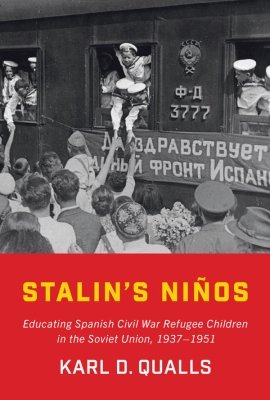Karl Qualls
Title VIII Summer Scholar
Professional Affiliation
W. Gibbs McKenney Chair in International Education and Professor of History, Dickinson College
Expert Bio
Karl's teaching interests include Russian and German history, the Holocaust, comparative revolutions (political, social, and cultural), dictators, urban history, refugees, childhood, and more. His most recent book Stalin’s Niños: Educating Spanish Civil War Refugee Children in the Soviet Union, 1937-51 (Toronto, 2020) examines refugee children of the Spanish Civil War who were raised in the Soviet Union and the special boarding schools designed for them and the educational methods used to develop the children into Hispano-Soviets. His previous book From Ruins to Reconstruction: Urban Identity in Soviet Sevastopol after World War II (Cornell, 2009) challenges notions of totalitarianism, investigates the creation of historical myths, and outlines the role of monuments and urban space and identity formation in a city torn between Ukraine and Russia. It is forthcoming in an open-source Ukrainian translation as Від руїн до реконструкції. Міська ідентичність у Рад Севастополь після Другої світової війни (Academic Studies Press, 2024). This is his third stint as a Kennan fellow, and both previous monographs have derived in part from that funding. These and other publication also have been supported by grants from the J. Paul Getty Foundation, , Library of Congress, American Council of Learned Societies, National Council for Eurasian and East European Research, and the International Research and Exchange Board, among others.
Wilson Center Project
"Transforming Childhood in Stalin’s USSR: Putin’s Model?"
Previous Terms
Kennan Institute Short-Term Grant, 2011. Project title: “Stalin’s Niños: Soviet Education of Refugee Children from the Spanish Civil War, 1937-51.”
Assistant Professor, Dickinson College. "Soviet Municipal Reconstruction, 1944-1953." Jul 01, 1999 - Aug 01, 1999. Project Summary: A general analysis of the Soviet Union-wide process of reconstruction and planning both to elucidate Sevastopol's uniqueness, and to provide the groundwork for future studies.
Insight & Analysis by Karl Qualls
- Article
- Cold War
Childhood Under Stalin | A Conversation with Title VIII Summer Research Scholar Karl Qualls

- Book
- Cold War
Stalin's Niños: Educating Spanish Civil War Refugee Children in the Soviet Union, 1937–1951


